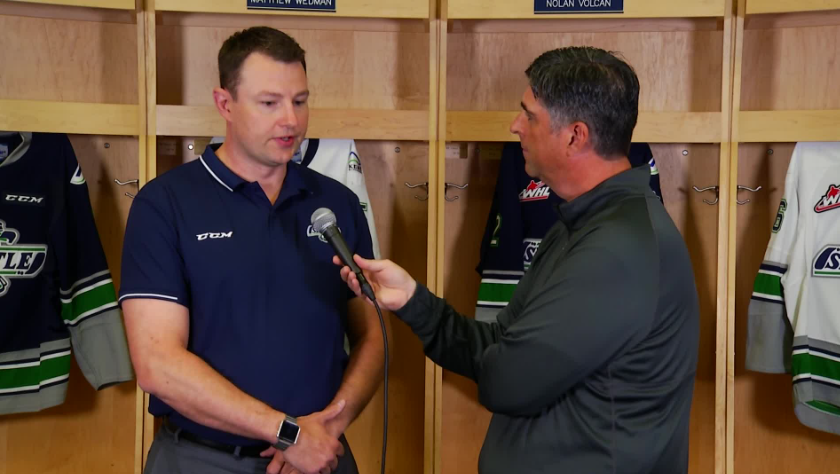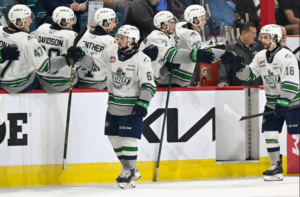
The Seattle Thunderbirds faced a tough challenge in their recent matchup against the Prince Albert Raiders, ultimately losing 4-3 after a fierce comeback attempt.

This defeat marked their second consecutive loss as they continued a demanding six-game road trip, with their next stop being Swift Current. The Thunderbirds found themselves in a familiar yet frustrating position, falling behind by three goals for the second straight game after the first period.
From the outset, the game was challenging for Seattle. The Raiders struck early, scoring on their very first shot, and quickly added two more goals on the power play. This set a tone that the Thunderbirds struggled to overcome. Head coach Matt O’Dette voiced his concern regarding the team’s slow starts, a recurring issue that has plagued their performance. “Good start we win, bad start we lose,” O’Dette remarked. This trend not only highlights the team’s struggles but also raises questions about their overall readiness and approach to games.
Despite the rocky beginning, the Thunderbirds demonstrated resilience in the second period. They rallied to tie the game at 3-3 by the end of the second intermission, thanks to Nathan Pilling’s impressive performance. Pilling scored two goals, marking his ninth and tenth of the season, while Braeden Cootes also found the back of the net. This response showcased the team’s potential and their ability to fight back from adversity.
Pilling, reflecting on the game, acknowledged the significance of their second-period performance but also lamented the inability to secure the win. “We didn’t have a really good start, so having a strong second was big,” he noted. His ability to find scoring opportunities was crucial, especially considering the pressure the team was under after their sluggish start. However, the disappointment of not finishing the game strongly weighed on him and the rest of the squad.
Unfortunately for the Thunderbirds, the third period told a different story. The Raiders regained the lead with the only goal of the final period and managed to maintain their advantage, marking their first home win of the season. O’Dette pointed out the inconsistency in their performance, saying, “The things we did in the second, we didn’t come out doing in the third. We needed to play the way we can play, with our formula, the entire sixty minutes.” This inconsistency is a major concern moving forward, as maintaining a high level of play throughout all three periods is crucial for success.
In goal, Grayson Malinoski started for Seattle and turned in a commendable performance with 31 saves. His ability to make several key stops kept the Thunderbirds in contention, especially when the team was struggling to find their footing. “He was great,” O’Dette praised Malinoski, emphasizing the importance of his performance in the context of the game. Malinoski’s strong showing is a bright spot for the team, as his development as a rookie goaltender will be essential for the Thunderbirds’ aspirations this season.
The loss in Prince Albert was particularly disappointing as it ended a four-game winning streak for the Thunderbirds at the Art Hauser Centre. Prior to this defeat, they had not lost there since 2012, underscoring the significance of their recent struggles in a place where they once thrived.
Amidst the challenges, there were a few positives for Seattle. Ashton Cumby earned his first point of the season with an assist on Seattle’s third goal, marking a personal milestone as his first point since joining the team in the middle of the previous season. His contributions, albeit small, signal potential growth for the team as they navigate through a rough patch.
However, the Thunderbirds were also dealing with injuries that complicated their lineup. They were without key players like Antonio Martorana and Owen Boucher, both of whom are sidelined week-to-week. Additionally, Will Jamieson’s absence due to injury from their previous game in Saskatoon added further strain. The injury situation highlights the need for depth within the roster, as teams often rely on their entire squad to step up when key players are unavailable.
In terms of special teams, the Thunderbirds showed some promise, going 2-for-4 on the power play and 5-for-7 on the penalty kill. This indicates that while their overall play may have faltered, they can still capitalize on opportunities when they arise. The effectiveness of their special teams will be vital as they continue to face off against tough opponents.
Looking ahead, the Thunderbirds must address their slow starts. The tendency to fall behind early is not only detrimental to their chances of winning but can also impact team morale. Consistent performances are critical, and O’Dette will need to instill a sense of urgency in his players right from the puck drop. Establishing an aggressive and focused mindset from the outset can help mitigate the risks associated with poor starts.
Furthermore, the coaching staff will need to evaluate their strategies and make necessary adjustments as they head into their final game of the road trip. Swift Current will present a new set of challenges, and the Thunderbirds must be prepared to adapt. With Pilling emerging as a key offensive player, leveraging his scoring ability while ensuring the defense is solidified will be crucial in their quest for victory.
Seattle Thunderbirds are at a pivotal moment in their season. The recent loss to the Prince Albert Raiders highlighted both their potential and their weaknesses. While they showcased resilience by fighting back from a three-goal deficit, the inability to maintain that momentum in the third period raises concerns that need to be addressed. With the challenges of injuries and inconsistent play, the Thunderbirds must come together as a unit, focusing on their fundamentals and adjusting their approach to secure victories moving forward. As they conclude their road trip in Swift Current, the goal will be to find a balance between offense and defense, ensuring that they can execute their game plan for a full sixty minutes.

Leave a Reply